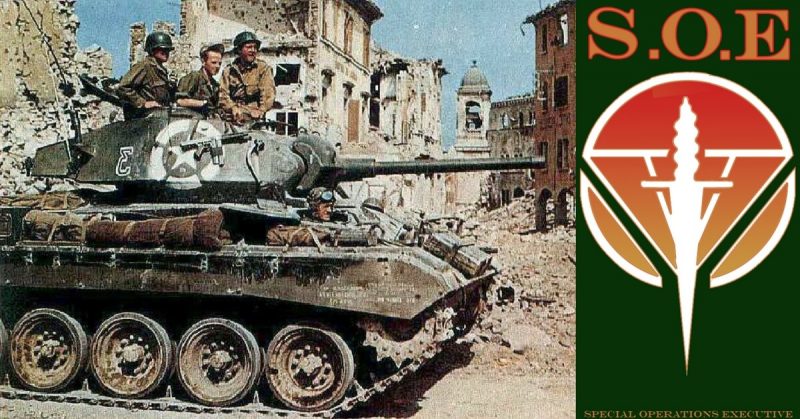Richard Mallaby, known to his compatriots as Dick, was an agent with the Special Operations Executive which was a British secret spy network in WW2. Dick parachuted in behind enemy lines during the Second World War and played an instrumental role in attaining Italy’s unconditional surrender. He was honored recently at a commemoration in Tuscany.
He is credited with assisting the securing of the armistice in Italy following the discharge of Benito Mussolini in 1943. Two years later, during the dwindling months of the war, he played a role in winning the capitulation of nearly 1 million German troops in Italy.
His secret assignments, close calls with death and inventiveness may have encouraged author Ian Fleming, who created the now-famous character James Bond, or ‘007.’ Fleming created the character after his own service in British naval intelligence.
Mr Gianluca Barneschi is an Italian historian and lawyer who has penned a book about Dick Mallaby after researching the subject for 20 years.
When the real-life 007 dropped by parachute into Italy, he had secret codes ensconced in a toothpaste tube, in addition to a radio crystal. Dick was an extremely brave Englishman. His missions were astounding; they’d make a great movie.
It is Mr. Barneschi who has applied pressure for the British agent’s courage to be officially acknowledged, over 70 years after he risked his life on secret operations in an Italy occupied by German troops.
It’s ironic that the British know less about Mallaby than the Italians, said Colonel Lindsay MacDuff, British defense attaché in Rome. Mallaby’s accomplishments during the war were considerable.
The youthful agent’s war service began in August 1943 when he parachuted, alone and at night, from a bomber into Lake Como in Italy’s northern region. He was codenamed “Olaf,” because of his blonde hair and blue eyes, and was the first Briton sent as an SOE operative into Italy.
The 24-year-old was supposed to connect with anti-Fascist partisan groups but Italian counter-intelligence learned of his assignment, and he was arrested.
The Italians searched his kit and found a wealth of incriminating evidence, the crystal for a wireless set hidden in the handle of a shaving brush, and photographic negatives secreted inside hollowed-out flashlight batteries.
He wore a wetsuit underneath his normal clothes, and had a knife secured to his arm. Mallaby was physically abused during interrogation and feared that he would be executed as a secret agent.
However, with Italy starting to look for a way out of the war after the removal of Mussolini only a few weeks before, his radio skills and fluent Italian soon gained him the advantage.
Taken from prison, the trained radio operator was employed as a key contact between the new Italian government and Anglo-American forces headquartered in Algiers.
Escorted to Rome, under the noses of the Germans, Mallaby transmitted coded messages and decoded those received back from Algiers, employing a covert communications signal that had “Monkey” as a codename.
As German forces took control, Mallaby accompanied Italian Marshal Badoglio and King Victor Emmanuel III when they dashed for the Allied lines, flying from Rome to Pescara on the Adriatic coast, where an Italian corvette picked them up and took them to Brindisi.
The armistice was signed in early September 1943. Mallaby played a stupendous solo function in the lengthy surrender negotiations, according to Roderick Bailey, the writer of Target Italy, a telling of the operations by SOE.
Mallaby was presented with the Military Cross. The citation for the medal said that “if not for his considerable coolness and loyalty,” the following Allied amphibious landings in Italy might have occurred with the country still fighting an enemy.
Mallaby returned to action in 1945. He moved into Fascist-controlled northern Italy from Switzerland but was quickly captured and questioned by the SS. He narrowly escaped the firing squad once again. He went on to take an important role in negotiations between the commander of all SS forces in Italy, General Karl Wolff, and the Allies.
He helped to obtain the capitulation of all German forces in Italy in May 1945 in an operation known as Operation Sunrise.
Mallaby was honored recently in the Tuscan town of Asciano, near Siena, where he lived in his youth.
His three children, Caroline, Richard, and Elizabeth, will be awarded a gold medal from Asciano’s mayor in acknowledgment of their father’s donation to the war effort, at a ceremony that includes Colonel MacDuff, The Telegraph reported.
Mallaby passed away in Verona in 1981 at the age of 62 and is buried on his estate in Tuscany. He is survived by his wife, who served as a coding expert with the First Aid Nursing Yeomanry during the war, and by his three children.
